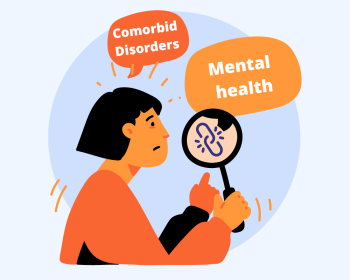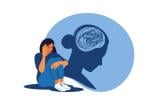Hidden Links: The Common Threads of Mental Health Disorders
Hidden Links: The Common Threads of Mental Health Disorders

In many illnesses, having one symptom makes you much more likely to have others. If you have a cough, you’re a lot more likely to also have a runny nose. Individuals with diabetes are more likely to also have hypertension. The same is also true for mental health disorders.
Individuals with depression tend to be more likely to suffer from other psychiatric conditions like anxiety. The recently crowned “World’s Fastest Man,” Olympic sprinter Noah Lyles, publicly disclosed that he suffers from both anxiety and depression, in addition to numerous other challenges he had to overcome to reach the top. While his elite running ability is profoundly rare, his “disease comorbidity,” or the simultaneous presence of multiple conditions, is much more common. In fact, research shows that more than half of all people with one mental health disorder will also meet diagnostic criteria for at least one other disorder1. Recently, the world of psychiatry research has placed more focus on these common co-occurrences and sought to better understand disease comorbidity in mental health. Tackling this issue could potentially allow mental health professionals to treat multiple psychiatric conditions at once.
As with all traits, both genes and the environment contribute to individual differences in the prevalence and manifestation of mental health disorders2. By investigating the genetic overlap of psychiatric conditions, researchers may be able to identify or create drugs and therapies aimed at treating common symptoms across disorders with similar genetic roots.
In a recent paper published in the research journal Nature Mental Health3, the authors examined whether the same genes contribute to the development of psychiatric conditions that share symptoms and tend to co-occur. To do this, data was analyzed from the UK Biobank, one of the world’s largest collections of genetic, lifestyle, health information, and neuroimaging samples from nearly half a million UK volunteers.
The results of the study showed that symptom overlap and co-occurrence between disorders varied across psychiatric conditions. This was also true at the genetic level: some disorders shared more genes than others. However, disorders that were more genetically similar did not always have the highest rate of symptom overlap or co-occurrence. For example, anxiety and depression shared most of their genetic roots but were only partly similar at the symptom level. In contrast, substance use disorders and obsessive-compulsive disorder (OCD) had overlapping symptoms but differed from each other in their genetic roots.
How could this be? Both genes and the environment influence how these disorders develop and interact. Genetics alone are not sufficient to explain the manifestation of a psychiatric condition. This is why many diseases like schizophrenia can occur in only one member of an identical twin pair, even though schizophrenia itself is one of the most strongly genetically linked mental health disorders. One’s lifestyle, social, and environmental setting can even lead to symptoms that are shared across genetically unrelated disorders.
This is not to say that genetics don’t play a role. Genetic differences partly explain why some people are more likely to develop post-traumatic stress disorder after being exposed to trauma4,5. But genes are not a determining factor.
The psychiatry world still has work to do before it fully understands the commonalities and differences between mental health disorders. This type of research will help move us closer to helping individuals with one, or multiple mental health disorders. Perhaps not to become Olympic champions like Noah Lyles, but to achieve their own personal victories, and ultimately live their fullest, healthiest lives.
References:
- Kessler RC, Chiu WT, Demler O, Merikangas KR, Walters EE. Prevalence, severity, and comorbidity of 12-month DSM-IV disorders in the National Comorbidity Survey Replication. Arch Gen Psychiatry. 2005 Jun;62(6):617–27.
- Polderman TJC, Benyamin B, de Leeuw CA, Sullivan PF, van Bochoven A, Visscher PM, et al. Meta-analysis of the heritability of human traits based on fifty years of twin studies. Nat Genet. 2015 Jul;47(7):702–9.
- Williams CM, Peyre H, Wolfram T, Lee YH, Seidlitz J, Ge T, et al. Characterizing the phenotypic and genetic structure of psychopathology in UK Biobank. Nat Mental Health. 2024 Jul 4;2(8):960–74.
- Wolf EJ, Miller MW, Sullivan DR, Amstadter AB, Mitchell KS, Goldberg J, et al. A classical twin study of PTSD symptoms and resilience: Evidence for a single spectrum of vulnerability to traumatic stress. Depress Anxiety. 2018 Feb;35(2):132–9.
- Kremen WS, Koenen KC, Afari N, Lyons MJ. Twin studies of posttraumatic stress disorder: differentiating vulnerability factors from sequelae. Neuropharmacology. 2012 Feb;62(2):647–53.

















